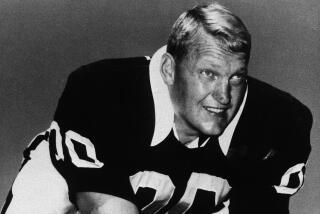Abbott Retained Class
It was last May 27, and Jim Abbott had just suffered through another dreadful game, the New York Yankees shelling him at Anaheim Stadium in a 16-5 victory that dropped Abbott’s record to 1-8.
Reporters entered the clubhouse afterward, and there was Abbott in his customary position--standing in front of his locker, showered, dressed, a grim but determined look on his face, like a kid who knew a spanking was coming and just wanted to get it over with.
We approached with trepidation, for even though the season was still young, this routine--interrogating Abbott after an ugly loss--was getting old.
The first question, the ice breaker, in these situations, is always the toughest, so I lobbed what I thought was a simple, straightforward, non-offensive query: “Jim, what has been the toughest part about this ordeal?”
It was as if I had slapped him upside the head. He bowed his head, paused and when he looked up there was moisture in his eyes.
“I feel like I’ve let the team down,” Abbott said, fighting back tears. “That’s the hardest part.”
This will be my lasting image of Abbott--not because I almost brought a grown man to tears, but because Abbott’s response said so much about one of the most incredible professional athletes--and human beings--I’ve dealt with in 15 years as a sportswriter.
Here was Abbott, who was released Monday by the Angels, enduring one of the most hellish seasons a pitcher could suffer, and all he could think about was his team.
He could have said how much his troubles were eating at him, how he couldn’t sleep at night, how he wondered if he would ever snap out of this funk. But his teammates--and the success and failure of the Angels--were more important.
Typical Abbott. Has there been a more selfless player in recent baseball history? After every loss, after every embarrassment in what became a 2-18 nightmare, Abbott was there to answer questions.
He could have hidden in the players lounge or training room. I sometimes wish he would have given us the Albert Belle treatment, told us all where we could stick our notepads, because we certainly would have understood.
And somehow, I can’t help but think we may have contributed to his struggles, that we were part of a dreaded routine Abbott couldn’t break: Pitch poorly, talk to reporters afterward, analyze his troubles with reporters between starts, pitch poorly again.
But Abbott would have none of this. The media were there for him during the good times, when Abbott helped the United States win the 1988 Olympic gold medal, when he went 18-11 with a 2.89 earned-run average for the Angels in 1991, and when he pitched a no-hitter for the Yankees in 1993.
So Abbott would be there for them now. It was part of his job, he figured, just like signing autographs, another thing Abbott always did, win or lose.
And I think Abbott wanted it this way, because it was important for him to be treated just like anyone else, not a pitcher who happened to be born without a right hand and who overcame insurmountable odds to even reach the major leagues, let alone earn Cy Young Award votes.
To be any less critical of Abbott last season would have implied sympathy, or special treatment, and those were the last things Abbott wanted.
Abbott recently told The Sporting News that “if I never pitch again, I’m very proud of what I’ve done. If this is it for me, if things don’t work out, I can look back and say I had a great run. I’m one of the luckiest people in the world.”
Indeed, Abbott has earned millions during an eight-year career in which he won 80 games and lost 100. He has been an inspiration to disabled children--make that all children--around the world, as evidenced by the stacks of mail in his locker every day.
Abbott also has tremendous perspective. He always maintained in the past year that no matter how difficult things got, going through such tough times would only make him a stronger person. He knew that regardless of how opponents battered him, he could still be a good husband, father and friend.
We could remember Abbott for his awful 1996 season, when he lost his fastball and his release point and his confidence on the mound.
Or, we could remember Abbott for that 5-0 shutout of Texas that stopped a nine-game losing streak in September, 1995, and turned the Angels’ season around.
Me? I’ll remember him for how he answered my question in the wake of that game last May 27, a response that was a true indication of what Jim Abbott has been and always will be:
A class act.
* END OF THE LINE: The Angels released Jim Abbott, swallowing the $5.6 million left on his contract. A1
(BEGIN TEXT OF INFOBOX / INFOGRAPHIC)
Abbott’s Career
A look at the career of Jim Abbott, released by the Angels on Monday.
* 1988: Signed by the Angels after stellar college career at Michigan. Also pitched U.S. team to gold medal in 1988 Summer Olympics and won the Sullivan Award, given annually to the nation’s top amateur athlete.
* 1989: Became only the 15th player since the free-agent draft was begun in 1965 to make professional debut in the majors. Finished rookie season 12-12, the first Angel rookie to win more than 10 games since Willie Fraser in 1987.
* 1991: Had best season in the majors with 18-11 record. Third in Cy Young Award voting behind Roger Clemens and Kevin Tapani.
* 1992: Struggled to a 7-15 record, but the real news occurred after the season. In December, after talks for a long-term contract broke down, Abbott was traded to the New York Yankees for J.T. Snow and pitchers Russ Springer and Jerry Nielsen.
* 1993: Pitched no-hitter for Yankees amid 11-14 season.
* 1994: Did not re-sign with the Yankees after a 9-8 record.
* 1995: Signed with the Chicago White Sox in April as a free agent, but was traded to the Angels for four minor leaguers after a 6-4 start. Finished the season 5-4 with the Angels.
* 1996: In January, Abbott signed a three-year, $7.8-million deal to stay with the Angels. The season, however, was a disaster. Abbott was sent to the minors for the first time in his career en route to a 2-18 record.
More to Read
Go beyond the scoreboard
Get the latest on L.A.'s teams in the daily Sports Report newsletter.
You may occasionally receive promotional content from the Los Angeles Times.






